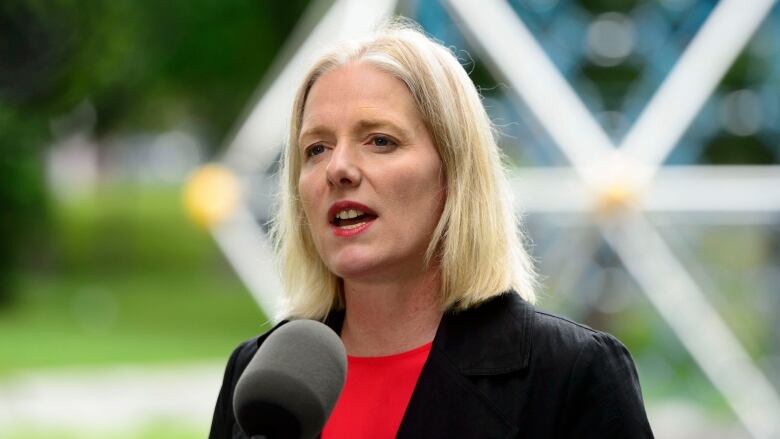Q&A: Catherine McKenna talks climate emergency, plastics ban and pipeline expansion
Controversial Trans Mountain expansion had to go ahead in the right way, says environment minister

The environment has takencentre stage recently, with the federal government announcing a single-use plastics ban, declaring a national climate emergencyand approving the Trans Mountain pipeline expansion all within a couple of weeks.
Environment Minister Catherine McKenna was in Halifax Thursday to talk about the plastics ban with her provincial counterparts.
She also spoke with Portia Clark of CBC Nova Scotia's Information Morning. The interview has been edited for length and clarity.
Straws, cutlery, and plastic bags are some of the things that might be on the banned item list. What about major sources of plastic in this region, like fishing gear, rope, and sewage outfalls?
People in Nova Scotia who care greatly about the water have seen we have a huge problem. We have far too much plastic pollution in our oceans, rivers and lakes. Canadians want us to do better and look at alternatives.
We have had challenges with [lost or abandoned] fishing gear. That's a priority with the Minister of Fisheries and Oceans. The plastic is ending up entangled with whales, with fish, with other marine mammals.
I'm certainly hoping at the table we can all agree we need to move forward to tackle plastics.
How do you decide what goes on the banned list and what doesn't?
[For] some plastics, a ban would make sense, and I think we've we're doing it on the science. In other cases, it's just about doing a better job recycling.
Also, you need to have affordable alternatives. It has to be realistic, and we need to be working with businesses.
Plastics coming from developing countries that don't have recycling programs is a huge part of the issue. Will Canada put more pressure on, or provide more help, to them?
At the G7 [Summit] which we hosted last year, we made an announcement that we started a new fund to invest money to support waste management in developing countries.
A lot of the plastics that we would see in our oceans that come over here are not coming from Canada. So this is a global problem. Pollution doesn't know any borders, whether it's plastic or air pollution.
With the conversation about dying right whales, what needs to change to help them?
It's a huge issue, and we're always devastated to hear about another death of a right whale. We've had a lot of problems recently with different species. Some of it is related to climate change, warming waters. It can also be fishing gear.
In the case of right whales, it's not my portfolio. It's the Minister of Fisheries and Oceans who's been working hard on it. But sometimes speed restrictions can make a difference.
It's not just about the environment. I would say it's about the economy too, because so many people rely on fishing for living or tourism. And so we need to be taking action and we have huge challenges.
How does the approval of the Trans Mountain pipeline expansion mesh with dealing with climate issues in the climate emergency we're in?
Of course it had to go ahead in the right way. We had to do proper consultations with Indigenous peoples, and it had to fit within our climate plan.
I was very happy that we committed every dollar from the pipeline to accelerate the transition to a cleaner future. We're already spending $60 billion on renewable energy, on clean technology, on energy efficiency, so this is other dollars that can go toward this.
We all have to transition, and it is not going to happen overnight. And we also need to make sure that people have jobs. We have to figure out this transition so it works for all Canadians.
With files from Information Morning Nova Scotia












_(720p).jpg)


 OFFICIAL HD MUSIC VIDEO.jpg)
.jpg)



























































































